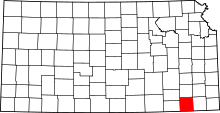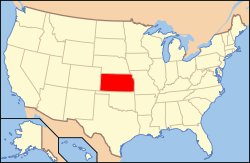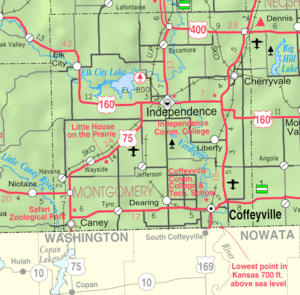Montgomery County, Kansas
| Montgomery County, Kansas | |
|---|---|
| County | |
 Location in the U.S. state of Kansas | |
 Kansas's location in the U.S. | |
| Founded | February 26, 1867 |
| Named for | Richard Montgomery |
| Seat | Independence |
| Largest city | Coffeyville |
| Area | |
| • Total | 651 sq mi (1,686 km2) |
| • Land | 644 sq mi (1,668 km2) |
| • Water | 8.0 sq mi (21 km2), 1.2% |
| Population | |
| • (2010) | 35,471 |
| • Density | 55/sq mi (21/km²) |
| Congressional district | 2nd |
| Time zone | Central: UTC-6/-5 |
| Website |
MgCountyKS |
Coordinates: 37°12′N 95°44′W / 37.200°N 95.733°W
Montgomery County (county code MG) is a county located in the U.S. state of Kansas. As of the 2010 census, the county population was 35,471.[1] Its county seat is Independence,[2] and its most populous city is Coffeyville.
History
Early history
For many millennia, the Great Plains of North America was inhabited by nomadic Native Americans. From the 16th century to 18th century, the Kingdom of France claimed ownership of large parts of North America. In 1762, after the French and Indian War, France secretly ceded New France to Spain, per the Treaty of Fontainebleau.
19th century
In 1802, Spain returned most of the land to France, but keeping title to about 7,500 square miles. In 1803, most of the land for modern day Kansas was acquired by the United States from France as part of the 828,000 square mile Louisiana Purchase for 2.83 cents per acre.
In 1854, the Kansas Territory was organized, then in 1861 Kansas became the 34th U.S. state. Montgomery County was established on February 26, 1867. It was named in honor of Richard Montgomery, an American Revolutionary War general killed in 1775 while attempting to capture Quebec City, in Canada, after successfully capturing two forts and the city of Montreal.[3]
When Kansas was admitted to the Union as a state in 1861, the Osage Indian reservation occupied a large tract of land near the southern border. The reservation had been established in 1825. After the Civil War ended, the Osage lands were coveted as the largest and last reserve of good land in the eastern part of the state. As early as 1866, the Osages were forced to cede tracts at the eastern and northern edges of the reservation. This treaty conceded white settlement on land in the eastern part of what is now Montgomery County.
For a brief time, the Osages attempted to maintain a boundary at the Verdigris River. The Verdigris flows from north to south through the center of Montgomery County. From the west the Elk River joins the Verdigris at a confluence slightly northwest of the geographical center of the county. In 1867 Frank and Fred Bunker established a primitive cattle camp on the west side of the Verdigris south of the confluence. Like the Osages, the Bunkers thought they were beyond the boundaries of civilization.
Early in 1869, however, settlers began to cross the Verdigris River, "at first under protest of the Indians, but the immense throng of settlers soon made all protests futile." Montgomery County was surveyed and organized in 1869; the governor appointed commissioners June 3.
Geography
According to the U.S. Census Bureau, the county has a total area of 651 square miles (1,690 km2), of which 644 square miles (1,670 km2) is land and 8.0 square miles (21 km2) (1.2%) is water.[4] The lowest point in the state of Kansas is located on the Verdigris River in Cherokee Township in Montgomery County (just southeast of Coffeyville), where it flows out of Kansas and into Oklahoma.
Adjacent counties
- Wilson County (north)
- Neosho County (northeast)
- Labette County (east)
- Nowata County, Oklahoma (southeast)
- Washington County, Oklahoma (south)
- Chautauqua County (west)
- Elk County (northwest)
Bodies of water
- Elk City Lake
- Elk River
- Havana Lake
- Liberty Lakes
- State Lake
- Verdigris River
State parks
- Elk City State Park
- Montgomery County State Park
Demographics
| Historical population | |||
|---|---|---|---|
| Census | Pop. | %± | |
| 1870 | 7,564 | — | |
| 1880 | 18,213 | 140.8% | |
| 1890 | 23,104 | 26.9% | |
| 1900 | 29,039 | 25.7% | |
| 1910 | 49,474 | 70.4% | |
| 1920 | 49,645 | 0.3% | |
| 1930 | 51,411 | 3.6% | |
| 1940 | 49,729 | −3.3% | |
| 1950 | 46,487 | −6.5% | |
| 1960 | 45,007 | −3.2% | |
| 1970 | 39,949 | −11.2% | |
| 1980 | 42,281 | 5.8% | |
| 1990 | 38,816 | −8.2% | |
| 2000 | 36,252 | −6.6% | |
| 2010 | 35,471 | −2.2% | |
| Est. 2015 | 33,314 | [5] | −6.1% |
| U.S. Decennial Census[6] 1790-1960[7] 1900-1990[8] 1990-2000[9] 2010-2013[1] | |||
The Coffeyville Micropolitan Statistical Area includes all of Montgomery County.
As of the U.S. Census in 2000,[10] there were 36,252 people, 14,903 households, and 9,955 families residing in the county. The population density was 56 people per square mile (22/km2). There were 17,207 housing units at an average density of 27 per square mile (10/km2). The racial makeup of the county was 85.77% White, 6.07% Black or African American, 3.19% Native American, 0.47% Asian, 0.02% Pacific Islander, 1.13% from other races, and 3.34% from two or more races. Hispanic or Latino of any race were 3.08% of the population.
There were 14,903 households out of which 29.80% had children under the age of 18 living with them, 53.00% were married couples living together, 10.10% had a female householder with no husband present, and 33.20% were non-families. 29.70% of all households were made up of individuals and 14.70% had someone living alone who was 65 years of age or older. The average household size was 2.37 and the average family size was 2.93.
In the county the population was spread out with 25.00% under the age of 18, 8.60% from 18 to 24, 24.70% from 25 to 44, 23.30% from 45 to 64, and 18.30% who were 65 years of age or older. The median age was 39 years. For every 100 females there were 93.20 males. For every 100 females age 18 and over, there were 88.60 males.
The median income for a household in the county was $30,997, and the median income for a family was $38,516. Males had a median income of $29,745 versus $20,179 for females. The per capita income for the county was $16,421. About 9.20% of families and 12.60% of the population were below the poverty line, including 16.80% of those under age 18 and 10.90% of those age 65 or over.
Law and government
Following amendment to the Kansas Constitution in 1986, the county remained a prohibition, or "dry", county until 1998, when voters approved the sale of alcoholic liquor by the individual drink without a food sales requirement.[11]
Transportation
Major highways
Airports
Education
Unified school districts
Colleges and universities
Communities

Cities
Unincorporated communities
Townships
Montgomery County is divided into twelve townships. The cities of Caney, Cherryvale, Coffeyville, and Independence are considered governmentally independent and are excluded from the census figures for the townships. In the following table, the population center is the largest city (or cities) included in that township's population total, if it is of a significant size.
| Township | FIPS | Population center |
Population | Population density /km² (/sq mi) |
Land area km² (sq mi) | Water area km² (sq mi) | Water % | Geographic coordinates |
|---|---|---|---|---|---|---|---|---|
| Caney | 10400 | 1,244 | 7 (18) | 176 (68) | 1 (0) | 0.30% | 37°3′44″N 95°54′12″W / 37.06222°N 95.90333°W | |
| Cherokee | 12850 | 541 | 5 (14) | 100 (39) | 0 (0) | 0% | 37°3′40″N 95°34′50″W / 37.06111°N 95.58056°W | |
| Cherry | 12875 | 517 | 5 (13) | 103 (40) | 0 (0) | 0.10% | 37°19′12″N 95°33′57″W / 37.32000°N 95.56583°W | |
| Drum Creek | 18700 | 537 | 6 (15) | 92 (35) | 0 (0) | 0.15% | 37°13′31″N 95°36′17″W / 37.22528°N 95.60472°W | |
| Fawn Creek | 23325 | 2,036 | 11 (30) | 179 (69) | 0 (0) | 0.06% | 37°3′22″N 95°44′7″W / 37.05611°N 95.73528°W | |
| Independence | 33900 | 2,342 | 14 (37) | 163 (63) | 5 (2) | 2.85% | 37°11′22″N 95°44′31″W / 37.18944°N 95.74194°W | |
| Liberty | 40275 | 473 | 4 (11) | 113 (44) | 0 (0) | 0.19% | 37°9′32″N 95°35′59″W / 37.15889°N 95.59972°W | |
| Louisburg | 42900 | 629 | 3 (9) | 185 (71) | 1 (1) | 0.75% | 37°18′25″N 95°53′56″W / 37.30694°N 95.89889°W | |
| Parker | 54525 | 1,212 | 18 (47) | 66 (26) | 0 (0) | 0.37% | 37°3′19″N 95°37′55″W / 37.05528°N 95.63194°W | |
| Rutland | 61925 | 302 | 2 (4) | 185 (71) | 2 (1) | 0.86% | 37°11′25″N 95°52′59″W / 37.19028°N 95.88306°W | |
| Sycamore | 69750 | 835 | 5 (13) | 169 (65) | 7 (3) | 3.86% | 37°18′28″N 95°44′53″W / 37.30778°N 95.74806°W | |
| West Cherry | 76825 | 239 | 2 (6) | 102 (39) | 0 (0) | 0.05% | 37°18′29″N 95°38′54″W / 37.30806°N 95.64833°W | |
| Sources: "Census 2000 U.S. Gazetteer Files". U.S. Census Bureau, Geography Division. | ||||||||
See also
|
|
References
- 1 2 "State & County QuickFacts". United States Census Bureau. Retrieved July 27, 2014.
- ↑ "Find a County". National Association of Counties. Retrieved 2011-06-07.
- ↑ Rydjord, John (1972). Kansas Place-Names. University of Oklahoma Press, Norman, Oklahoma. p. 381. ISBN 0-8061-0994-7.
- ↑ "US Gazetteer files: 2010, 2000, and 1990". United States Census Bureau. 2011-02-12. Retrieved 2011-04-23.
- ↑ "County Totals Dataset: Population, Population Change and Estimated Components of Population Change: April 1, 2010 to July 1, 2015". Retrieved July 2, 2016.
- ↑ "U.S. Decennial Census". United States Census Bureau. Retrieved July 27, 2014.
- ↑ "Historical Census Browser". University of Virginia Library. Retrieved July 27, 2014.
- ↑ "Population of Counties by Decennial Census: 1900 to 1990". United States Census Bureau. Retrieved July 27, 2014.
- ↑ "Census 2000 PHC-T-4. Ranking Tables for Counties: 1990 and 2000" (PDF). United States Census Bureau. Retrieved July 27, 2014.
- ↑ "American FactFinder". United States Census Bureau. Retrieved 2008-01-31.
- ↑ "Map of Wet and Dry Counties". Alcoholic Beverage Control, Kansas Department of Revenue. November 2006. Retrieved 2007-12-28.
Further reading
- History of the State of Kansas; William G. Cutler; A.T. Andreas Publisher; 1883. (Online HTML eBook)
- Kansas : A Cyclopedia of State History, Embracing Events, Institutions, Industries, Counties, Cities, Towns, Prominent Persons, Etc; 3 Volumes; Frank W. Blackmar; Standard Publishing Co; 944 / 955 / 824 pages; 1912. (Volume1 - Download 54MB PDF eBook),(Volume2 - Download 53MB PDF eBook), (Volume3 - Download 33MB PDF eBook)
External links
| Wikimedia Commons has media related to Montgomery County, Kansas. |
- County
- Maps
- Montgomery County Maps: Current, Historic, KDOT
- Kansas Highway Maps: Current, Historic, KDOT
- Kansas Railroad Maps: Current, 1996, 1915, KDOT and Kansas Historical Society
 |
Elk County | Wilson County | Neosho County |  |
| Chautauqua County | |
Labette County | ||
| ||||
| | ||||
| Washington County, Oklahoma | Nowata County, Oklahoma |

